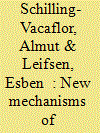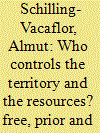| Srl | Item |
| 1 |
ID:
152779


|
|
|
|
|
| Summary/Abstract |
In this special issue, the focus is on the dynamics and use of participatory mechanisms related to the rapid expansion of the extractive industries worldwide and the ways it increasingly affects sensitive natural environments populated by indigenous and other marginalised populations. We offer an empirically grounded and theoretically innovative comparative analysis of practices that aim to enhance participation, negotiation and influence as a response to the expansion of extractive industries. On the one hand, we question the assumption often presented in scholarly debates that participatory processes will contribute to making environmental governance not only more legitimate and effective, but will also lead to the empowerment of marginalised social groups. On the other, we draw on our empirical studies and insights to indicate ways local groups and their allies try to gain ownership and influence decision-making through a range of related participatory mechanisms, ranging from state-led or corporation-led processes like prior consultation and FPIC, compensation practices, participatory planning exercises and the participation in environmental impact assessments (EIAs) to community-led consultations, or community-based or controlled FPIC and impact assessment processes and struggles for community-based governance of natural resource uses.
|
|
|
|
|
|
|
|
|
|
|
|
|
|
|
|
| 2 |
ID:
143572


|
|
|
|
|
| Summary/Abstract |
Indigenous peoples’ right to prior consultation and to informed consent represents the basis of the new global model shaping state–indigenous relations. Consultation processes promise to enable indigenous people to determine their own development and are especially promoted when extraction projects with significant socio-environmental impacts are planned on indigenous lands. In this article we draw on debates on participatory development in order to analyse the first state-led consultations in Bolivia’s and Peru’s hydrocarbon sectors (2007–14). The analysis shows that effective participation has been limited by (1) an absence of indigenous ownership of the processes; (2) indigenous groups’ difficulties defending or even articulating their own visions and demands; and (3) limited or very general outcomes. The study identifies real-life challenges, such as power asymmetries, a ‘communication hurdle’ and appropriate timing – as well as simplistic assumptions underlying the consultation approach – that account for the unfulfilled promises of this new model.
|
|
|
|
|
|
|
|
|
|
|
|
|
|
|
|
| 3 |
ID:
152781


|
|
|
|
|
| Summary/Abstract |
The article scrutinises the struggles over prior consultation and free, prior and informed consent (FPIC) and analyses the divergent interpretations of what this right would entail in Bolivia. Similar contestations have played an important role in resource conflicts across Latin America. Using rich empirical data, the article discusses (1) disputes over legal norms regulating this participatory right, (2) related claims to territorial control and resource sovereignty, and (3) consultation participants’ constrained influence. In doing so, it focuses on the Guaraní’s diverse attempts to shape consultation processes and their outcomes according to their own ends and shows how many of these initiatives have been curtailed.
|
|
|
|
|
|
|
|
|
|
|
|
|
|
|
|